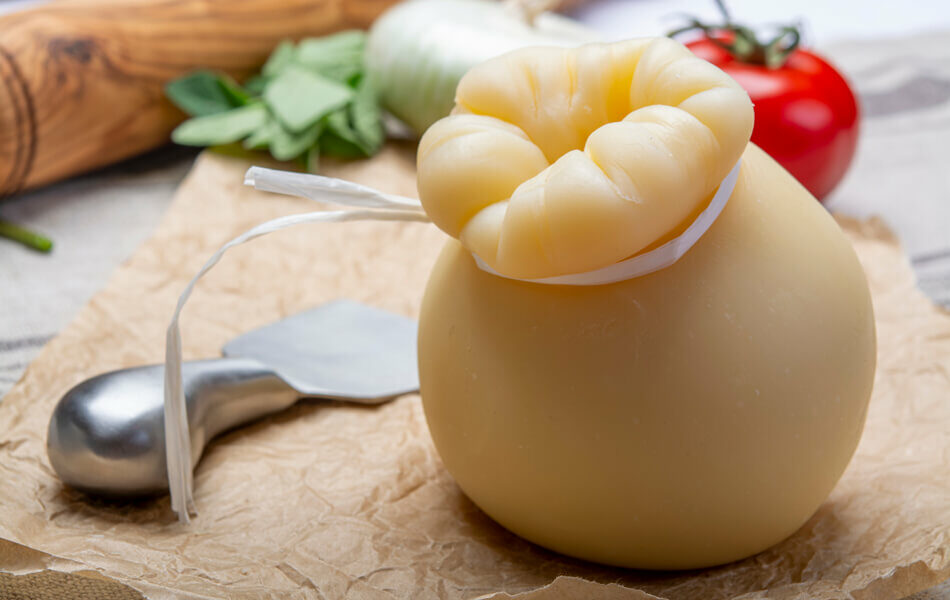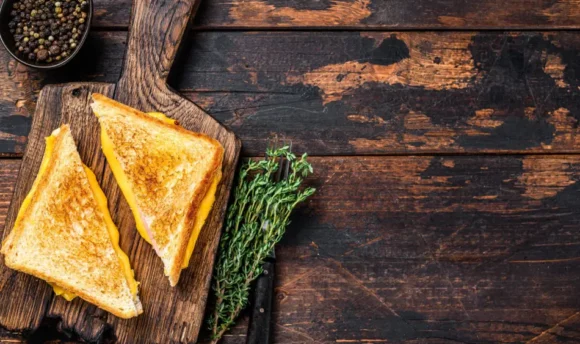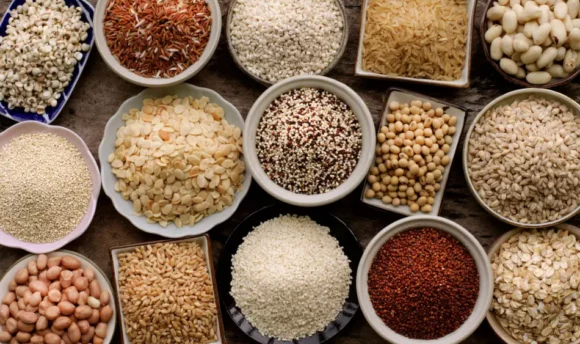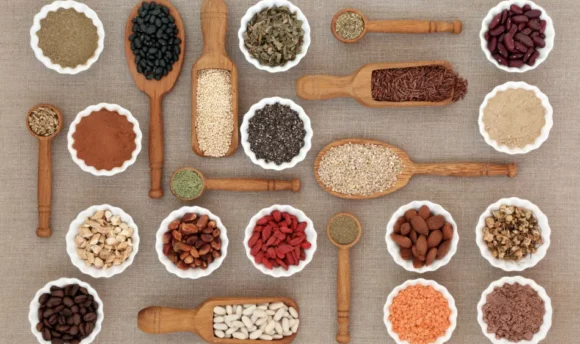Is Provolone Cheese Healthy? Nutrition, Benefits
Provolone cheese is a mild-flavored cheese often used in pizzas, baked dishes, and sauces. This article explores the nutritional content of provolone cheese and its health benefits.

An Italian semi-hard cheese manufactured from cow’s milk is called provolone. It is a stretched-curd cheese from the pasta filata family, much like mozzarella. Its flavor is gentle and buttery, and its color is pale yellow.
It has a rounded tube or ball shape. There are three types of provolone cheese: dolce, which is aged for 2 to 3 months, piccante, which is aged for 4 months or longer, and American deli provolone, which resembles provolone dolce but has a much milder flavor.
Provolone dolce, also known as deli provolone, is a good melting cheese that works well in sandwiches, casseroles, and pizza.
The sharp flavor of provolone piccante makes it a delicious addition to a cheese plate, as either a snack or grated onto pizzas, pasta, or anything else that normally has a cheese topping.
Is Provolone Cheese Healthy?
Yes, provolone cheese is good for your health. You must eat provolone cheese in moderation by keeping in mind its unhealthy saturated fat and sodium content.
A high sodium diet can increase the risk of high blood pressure, and saturated fat increases the level of bad cholesterol in your body.
It is abundant in calcium. There is nearly 756mg of calcium present per 100g serving. Calcium is necessary for your body to create and maintain strong bones. Calcium is also required for the proper functioning of your heart, muscles, and nerves.
Along with calcium, it also contains vitamin A, which is good for eyesight.
4 Provolone Cheese Benefits
Because of its calcium content, provolone cheese has several health benefits; eating moderate amounts of this cheese provides essential nutrients for bone strength, eyesight, and red blood cell production.
Here are some of the health benefits of this cheese:
#1 Promotes eye health
Your vision is significantly impacted by vitamin A. Vitamin A is found in most animal products like cheese. Your eye must create specific pigments for your retina to function properly and for you to view the complete spectrum of light.
Lack of vitamin A causes night blindness because it stops the production of these pigments. Vitamin A is also required to nourish the cornea and other components of the eye.
Adult men should consume 900mcg of vitamin A per day, while adult women should consume 700mcg. 236mcg of vitamin A is present per 100g serving of this cheese.
#2 Promotes gut health
Food preservation through fermentation dates back thousands of years. Microorganisms like yeast and bacteria naturally convert carbohydrates like starch and sugar into alcohol or acids during the fermentation process.
Additionally, fermentation enhances the development of probiotics or helpful microorganisms. The probiotics created during fermentation can aid in maintaining the proper balance of beneficial bacteria in your stomach and may provide relief from some digestive issues.
In the process of making provolone cheese, fermentation is used. Cheeses that have aged contain probiotics. Provolone, swiss, gouda, and cottage cheese all contain it.
#3 Helps to maintain healthy bones
You need calcium to maintain strong bones. The majority of the calcium in your body is used to sustain the formation and health of your bones and teeth. The most abundant mineral in the human body is calcium. Vitamin D is required for your body to absorb calcium.
Lack of calcium in the diet can result in brittle bones that are more susceptible to disease and fractures.
The recommended daily calcium intake for individuals is 2,500mg for those who are 19–50 years old. For individuals 51 and older, the daily maximum is 2,000mg.
Calcium content is high in provolone cheese. It contains nearly 756mg of calcium per 100g serving.
#4 Increases the production of red blood cells
Cobalamin, often known as vitamin B12, is a vital vitamin that your body cannot make on its own. Animal products naturally contain it. The body uses vitamin B12 for a variety of purposes.
It is important for red blood cell creation, DNA synthesis, and supporting the normal functioning of your nerve cells.
The recommended daily intake (RDI) for adults is 2.4mcg on average; however, it is higher for women who are pregnant or nursing. Provolone cheese contains 1.46mcg of vitamin B12 per 100g serving.
Vitamin B12 is required for the synthesis of red blood cells. Megaloblastic anemia results from excessively low vitamin B12 levels, which affect how red blood cells are made.
Swiss Cheese vs. Provolone Cheese
Swiss cheese is often a hard cheese prepared from cow’s milk. Swiss cheese refers to a variety of cheeses produced in Switzerland, including Gruyere and Emmental cheese.
On the other hand, Italian cheese called provolone has its roots in the Po River Valley of Southern Italy.
Provolone is noted for its light, buttery flavor; swiss cheese is renowned for its sweet, nutty flavor.
These two varieties of cheese differ significantly in how they are made. Stretched-curd cheese provolone requires more work to produce than Swiss cheese.
Swiss cheese is a washed-rind cheese, which means that during the maturing process, flavorings are brushed onto the cheese.
Swiss cheese is more expensive than provolone. Provolone cheese typically sells for roughly $12 for 1lb in the market, whereas Swiss cheese costs about $18 for the same amount.
Swiss cheese may contain slightly more fat and cholesterol than provolone, depending on the variety. A 100g serving of swiss cheese contains 18.2g of saturated fat and 93mg of cholesterol. 100g of provolone contains 17.1g of saturated fat and 69mg of cholesterol.
Vitamin A, E, and B12 levels are higher in swiss cheese. Swiss cheese also has higher levels of calcium, phosphorus, and zinc. Provolone has a lot of sodium. Swiss cheese is beneficial since it has a low sodium content and a high calcium content.
Provolone Cheese Nutrition Facts
The below nutrition information is taken from the United States Department of Agriculture (USDA) databases for 100g of provolone cheese.
Nutritional table (per 100g)
| Calories/Nutrient (per 100g) | Amount |
| Calories (kcal) | 351 |
| Sodium (mg) | 727 |
| Net Carbs (g) | 2.14 |
| Fiber (g) | 0 |
| Sugar (g) | 0.56 |
| Fats (Total) | 26.6 |
| Protein (g) | 25.6 |
| Cholesterol (mg) | 69 |
High in sodium
Provolone cheese is high in sodium. Every 100g of this cheese contains 727mg of sodium, which is 48.46% of the recommended daily intake. The American Heart Association recommends not to consume more than 1,500mg of sodium per day.
Cheese varieties like swiss cheese, fresh mozzarella cheese, and ricotta cheese have relatively less sodium in them.
High in calories and fats
There are approximately 351 calories present in provolone cheese.
One ounce of provolone cheese has 4.85g of saturated fat and 19.6mg of cholesterol, which is substantially lower than several other kinds of cheese: Cheddar cheese has 6g of saturated fat per ounce and 29.8mg of cholesterol per ounce. Meanwhile, cream cheese has 5g of saturated fat per ounce and 31.2mg of cholesterol per ounce.
Out of the 26.6g of total fat content in provolone, 17.1g is saturated fat. As the saturated fat content is high in this cheese, one must consume it in moderation. Your LDL (bad) cholesterol is increased by saturated fat.
High LDL cholesterol raises your risk of heart disease and stroke.
Reduce your intake of saturated fats to less than 7% of your daily calorie intake to further lower your chance of developing heart disease.
High in protein
All animal products have good amounts of protein, and provolone cheese has about 25.6g of protein per 100g serving.
Provolone has more proteins in it when compared to cottage cheese and soy cheese varieties. Cottage cheese and soy cheese contain nearly 11g of protein per 100g serving.
The Recommended Dietary Allowance (RDA) for protein is 0.8g of protein per kilogram of body weight. The RDA is the quantity of a nutrient you need to consume to fulfill your essential nutritional needs.
Low in carbohydrates
Provolone cheese has a low carbohydrate content. Provolone cheese has about 3% of its calories from carbs. Every 100g of provolone cheese serving gives you 2.14g of net carbohydrates.
Because of its low carbohydrate content, this cheese can be consumed on a keto diet.
Provolone cheese has a glycemic index (GI) score of 27, and it is considered a low GI food.
High in vitamins and minerals
Provolone cheese has a lot of vitamins and minerals. It is known to have numerous health benefits because of its calcium and vitamin A content.
Provolone cheese is rich in calcium, an important mineral for the health of your bones and teeth. Adults need between 1,000 and 1,200mg of calcium every day. Provolone cheese has 756mg in 100g.
Vitamin A helps maintain good eye health. Each 100g portion of provolone cheese contains 236mg of vitamin A.
Provolone cheese consumption also gives your body the required amounts of vitamin B12.
3 Health Risks of Consuming Provolone Cheese
Provolone cheese is one of the most extensively consumed cheeses and is used in many different types of food. Provolone is not the ideal cheese or nutritional choice if you have specific health ailments or issues.
If you enjoy provolone cheese, be cautious in the following cases:
#1 Risk of developing listeriosis
The bacterial agent listeria monocytogenes causes listeriosis, a flu-like condition that can be fatal in some sensitive persons, including pregnant women, those with impaired immune systems, and people over the age of 65.
Provolone is a hard, matured cheese, so there is very little danger of listeria transmission. Furthermore, pasteurization considerably lowers the danger of listeria transmission in the majority of provolone varieties.
If the provolone smells strange or has an unusually hard texture, it could be a sign that it has gone bad.
#2 Lactose intolerant individuals
A lack of the enzyme lactase causes lactose intolerance. When consuming cheeses like provolone, lactose intolerant people may have symptoms including bloating, diarrhea, flatulence, etc.
Even while provolone cheese has a significantly lower lactose content compared to other fresh cheese varieties such as fresh mozzarella, cream cheese, and cottage cheese, some particularly sensitive people can still have a serious reaction even if they consume the tiniest amount of provolone.
#3 Low tyramine diet
Tyramine and provolone don’t go well. Avoid provolone cheese when you are on a low tyramine diet.
A naturally occurring monoamine substance called tyramine can be discovered in some old, fermented, or rotten foods.
Tyramine use might exacerbate or worsen symptoms, including a sharp rise in blood pressure, a severe headache, chest pain, and shortness of breath if you have conditions like recurrent migraines or Parkinson’s disease.
Healthy Provolone Cheese Recipe
Provolone cheese is a tasty cheese that can be used in a wide variety of dishes. It has an excellent melting point and is an excellent source of calcium. This makes it a great choice for snacking on throughout the day.
Here’s a healthy provolone cheese recipe you can make at home:
Quesadillas with roasted vegetables and provolone
Servings: 5
Calories: 226
Ingredients (5 servings):
- 1 zucchini
- 1/2 eggplant
- 1 red bell pepper
- 1 yellow squash
- 1 red onion
- 1 tbsp extra virgin olive oil
- Salt and pepper, to taste
- 1/2 avocado, mashed
- 1 tbsp light mayonnaise
- 1 jalapeño, seeded and finely chopped
- 1 garlic clove, minced
- 5 tortillas
- 5 slices of provolone cheese
- Cooking spray
Preparation:
- Preheat the oven to 400°F.
- Cut the vegetables lengthwise into ¼-inch slices. Place the vegetables on a baking sheet and brush both sides with oil. Depending on your taste, add salt and pepper. Roast the vegetables for 15–20 minutes or until tender.
- Mix the avocado, mayonnaise, jalapeño, and garlic in a small bowl.
- 1 tablespoon of the mashed avocado mixture should be spread on half of each tortilla. Divide the vegetables among the tortillas and top each with 1 halved slice of provolone.
- To make a quesadilla, fold the tortillas over. Place the quesadillas in a large skillet or grill pan over medium heat. Spray cooking oil on the top of each quesadilla before flipping it over and doing the same on the other side.
- Cook or grill the tortillas for 3–4 minutes on each side or until they are gently browned and the cheese has melted.
Healthy provolone recipe nutrition facts:
| Calories/Nutrient (per serving) | Amount |
| Calories (kcal) | 226 |
| Sodium (mg) | 427 |
| Net Carbs (g) | 16 |
| Fiber (g) | 13 |
| Sugar (g) | 5 |
| Fats (Total) | 9 |
| Protein (g) | 9 |
| Cholesterol (mg) | 7 |
FAQs
Provolone cheese is good for you if you add it occasionally to your healthy diet. Since provolone cheese has unhealthy amounts of saturated fat and sodium, it cannot be consumed in excess. Out of 26.6g of fats in provolone cheese (100 g), 17.1g is saturated fats.
Provolone cheese is high in cholesterol. The cholesterol content in this cheese is 69mg per 100g serving. As provolone cheese is high in saturated fats, excessive consumption can elevate “bad” LDL cholesterol levels, raising your risk of heart disease and stroke.
It is good for weight loss as it has less net carbohydrate content. There are nearly 2.14g of net carbohydrates per 100g serving.
This cheese will also help in weight loss if you are following a keto diet, as it is a keto-friendly food. Still, one must always consume it in moderation as it has a high amount of saturated fats and sodium content.
A Word From Our Nutritionist
Due to its high calcium content, provolone cheese has a lot of health advantages. Consuming this item in moderation supplies essential minerals for red blood cell synthesis, eye health, and bone health.
Even though provolone has a very low carb count, different brands will include different volumes and types of milk, and if you follow a low-carb diet, this will alter the carb count.
A typical cause of someone being unable to eat cheese is lactose intolerance. When your body struggles to digest or break down lactose, you develop lactose intolerance. This cheese has a relatively low lactose content, so depending on your lactose sensitivity, you might be able to eat it.
When kept in the refrigerator, provolone cheese, whether it is sliced or in a block, will last for 2–3 weeks. This cheese should not be left out for longer than 2 hours due to the possibility of product spoilage.
Conclusion
Provolone cheese is not only tasty, but it is also low in carbs and glycemic index, making it suitable for a keto diet. Provolone has a lot of sodium and calories. These two factors must be considered. Additionally, provolone can be used in place of mozzarella or even in combination with it to enhance flavor and texture.

















































 Select your language:
Select your language: 








